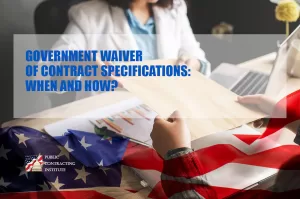Waiver: The voluntary relinquishment or abandonment—express or implied—of a legal right or advantage. Black’s Law Dict. (10th Ed. 2014)
This blog has discussed situations where the government has waived a delivery schedule in a contract. See “How Many Mistakes Can A Defense Logistics Agency Contracting Officer Make?” (January 2, 2018) and “Was Your Delivery Date Waived? Was Your Default Termination Improper?” (April 25, 2016). But there is another important waiver—when the Government waives contract specifications or requirements. How does that occur? A good example is found in American West Construction, LLC, ASBCA No. 61094, Dec. 19, 2017.
The Army Corps of Engineers awarded a contract to American West to construct bridges over irrigation canals in Texas, near the border with Mexico. To access the site of one of those bridges, the contract provided for construction of two temporary bridges over another canal and a drainage ditch. The two temporary bridges were to be disassembled and removed after completion of the main bridge.
American West and its subcontractor were concerned about time to complete if they built the temporary bridges, and decided to access the construction site via a levee on the land of a Water District. America West obtained the necessary permit and easements from the Water District, and never built the temporary bridges, but proceeded to build and complete the main bridge on the schedule required by the contract. After the completion of the bridge, the Corps of Engineers sought a credit (claim) of $40,239.89, as the estimated difference in cost between performing the project with temporary bridges and the cost of performing it without them.
The Board denied the Corps’ claim. The Board noted that the Government has the right to demand construction according to contract specifications, and to a credit for work performed. However, the government had waived its right to construction of the temporary bridges, and thus had waived its right to a credit. Here’s why.

The law provides that the government may waive strict compliance with its contractual requirements and be estopped from later re-imposing those requirements upon the contractor. Gresham & Co. v. United States, 470 F. 2d. 542, 554. (“There can be no doubt that a contract requirement for the benefit of a party becomes dead if that party knowingly fails to exact its performance, over such an extended period, that the other side reasonably believes the requirement to be dead.”) The Board stated that that is exactly what happened here.
Both the Corps Administrative Contracting Officer and its Quality Assurance Representative were well aware of American West’s decision to use levees instead of temporary bridges. American West told the government of these plans multiple times, and the government was on-site and watched the actual contract work. Although the government had rejected an American West traffic plan that included use of the levee in September 2015, that rejection was based on uncertainty of obtaining the permit from the Water District—but the permit was received the very next month and the Corps was so advised by the contractor. The Government made no signal discouraging American West from proceeding with the levee plan, giving the contractor good cause to believe that the Government agreed with the elimination of the temporary bridges that were specified in the contract. The Board held that the contract requirement for the temporary bridges was “dead.” Finally, although the Corps argued that its willingness to permit a deviation from contractual requirement was conditioned upon receiving a credit (equitable adjustment) from American West, the government’s conditional waiver only became evident after the contractual requirement was effectively eliminated. So, no credit was appropriate.
The takeaway: (1) If a contractor wants to make a change to contract requirements or specifications, the contractor must be sure to clearly (in writing!) advise the government of the change, as American West did in this case.
(2) Be sure the government is made aware that you are actually executing the change as you proposed it, as American West did here.
(3) If the government doesn’t object, or ask for a credit, or ask for an equitable adjustment until after you are finished, the requirement for that specification is dead, and it cannot be revived. The government will not be entitled to either a credit or an equitable adjustment from the contractor.
For other helpful suggestions on government contracting, visit:
Richard D. Lieberman’s FAR Consulting at https://www.richarddlieberman.com/, and Mistakes in Government Contracting at https://richarddlieberman.wixsite.com/mistakes/.



